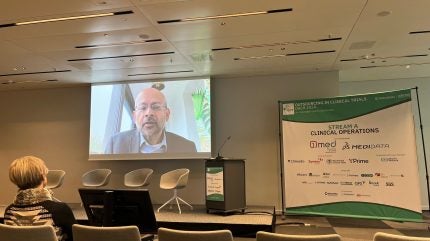
The World Health Organization’s (WHO) new framework aimed at strengthening clinical trial systems addresses a global issue of “major research waste”, according to Vasee Moorthy, senior advisor of research and development at WHO.
Following the 2022 World Health Assembly, where this issue was discussed, a two-year consultation period revealed four critical issues, which were outlined in WHO’s Guidance for best practices for clinical trials document: insufficiently designed trials, limited stakeholder engagement, exclusion of certain populations, and gaps in trial infrastructure. Speaking at the Outsourcing in Clinical Trials (OCT) DACH 2024 conference, which took place in Zurich, Switzerland from 29 to 30 October, Moorthy noted: “All the WHO Member States agreed that this was a big problem.”

Discover B2B Marketing That Performs
Combine business intelligence and editorial excellence to reach engaged professionals across 36 leading media platforms.
“We see inefficiency in the way that the regulator and the ethics systems work together.” A lot of improvements could be made with multi-agency approval processes, the timelines for approving large, multi-site, multinational studies, he added.
Moorthy underscored the value of valid design principles, proportionate data collection, and risk-based quality management in trials. Furthermore, he highlighted the importance of involving patients and communities in this process: “Having some involvement from patients or communities, depending on the context as to whether the interventions, outcomes, populations included make sense from the patient perspective – that we see as central,” Moorthy added.
The framework also prioritises transparency and public disclosure of trial results, the feasibility of conducting trials within intended contexts, and the adoption of innovative trial designs.
One major WHO recommendation is digitalisation and the use of electronic records, as research currently lags behind clinical care in this area. The guidance encourages a shift towards fully digitalised clinical trial processes and data management. There are number of issues with moving to a fully digital approach, one being the number of systems available meaning sites may have to work between multiple systems when conducting studies. Other issues include the availability and speed of tech support during patient visits and the necessity for training when systems are implemented.

US Tariffs are shifting - will you react or anticipate?
Don’t let policy changes catch you off guard. Stay proactive with real-time data and expert analysis.
By GlobalDataFor researchers, Moorthy advised focusing on “fit for purpose” trial designs, decentralisation, digitalisation, and transparency. For policymakers, he urged a shift from protecting against research risks to enabling high-quality, patient-centric trials.
“If done appropriately, clinical and public health outcomes only improve through engaging with research and by enabling high-quality research, which meets the right standards,” Moorthy concluded.





